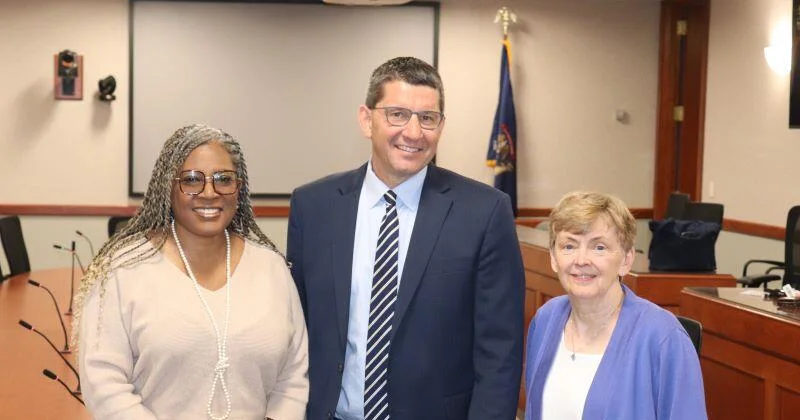
I’ll be honest — when ChatGPT first blew up, I was resistant. As an elder millennial I just didn’t want to learn another tool or app, and really didn’t have the time to. Not to mention, there’s literally no more storage on my phone, y’all! I just couldn’t.
Fast forward to today, and here I use AI in some form or function in every area of my life to organize, plan and assist with day to day tasks. I’ve been reverted. And the irony? My resistance to embracing AI initially made me realize just how important it is for all of us, especially Black women, to not just adapt to this technology but to position ourselves strategically within it.
Simply put: now is the time to get with it, or get lost. Because unfortunately, as we know it, Black women have been leaving (i.e. being forced out) the labor force in significant numbers, and women are disproportionately represented in roles at high risk of automation, with eight out of 10 women in the US workforce in occupations highly exposed to generative AI automation. Meanwhile, AI programs used in recruitment can “exacerbate existing biases” and contribute to “hiring gaps” for Black women. These realities make it crystal clear why we need to be strategic about our career moves right now, and doing everything we can to stay ahead of the curve.
Now, I already know some of you are still going to be resistant, especially my internet aunties and uncles out there. And I’ve accounted for y’all too. But the thing that keeps me optimistic for those who don’t want to jump on the AI bandwagon is that even though AI is reshaping the job market, it’s also creating unprecedented opportunities for those who position themselves right. The key is identifying careers that leverage our uniquely human strengths such as emotional intelligence, creative problem-solving, cultural competency, and the ability to navigate complex interpersonal dynamics that no algorithm can replicate. So, if those types of jobs seem like the ones you want to embrace, here are a few ideas to future proof your career.
Registered Nurses and Healthcare Specialists
The healthcare sector remains one of the most AI-resistant industries, and thankfully Black women are already making significant impacts here. Nursing, in particular, is still that girl. The field is steady, salaries hover around $75K, and demand isn’t slowing down anytime soon with projected growth of 6% through 2032 according to the Bureau of Labor Statistics. But don’t overlook specialized roles like nurse practitioners (median salary $172,000), certified nursing assistants, and patient advocates.
Mental health counselors and licensed clinical social workers are seeing explosive demand, especially professionals who understand the unique mental health challenges facing communities of color. These roles typically require a master’s degree but offer starting salaries in the $50,000-$70,000 range with significant growth potential.
Physical therapists (median salary $95,000), occupational therapists ($85,000), and speech-language pathologists ($80,000) also fall into this category. These roles require hands-on assessment, personalized treatment planning, and the ability to motivate and connect with patients on an emotional level. The aging population means demand for these services will only increase, making them excellent long-term career bets.
Electricians, Plumbers, and Green Energy Technicians
I know we saw flying cars and other sorts of technology in The Jetsons that we thought we’d see by now, but we’re still not there. As a result, skilled trades still remain in high demand despite AI advancement. These jobs still need real people who can roll up their sleeves and fix things you can’t YouTube your way out of. Electricians earn a median salary of $60,040 and can make significantly more with specializations. Plumbers average $56,330 but experienced professionals in major markets often earn six figures. HVAC technicians start around $50,590, and solar panel installers are seeing 26% job growth with median pay of $47,670. Black women showing up in these spaces also flips the script because who says we can’t wire a building or install solar panels?
Wind turbine technicians, energy efficiency specialists, and sustainable building consultants are also booming fields where Black women can establish themselves as leaders in emerging markets. Many of these roles offer paid apprenticeships, meaning you can earn while you learn without taking on student debt.
Information Security Analysts and Cybersecurity Specialists
With AI creating new security vulnerabilities, cybersecurity professionals are more essential than ever. Information Security Analysts earn a median salary of $103,590 with 33% projected growth through 2032. Cybersecurity specialists, penetration testers, and security consultants are seeing similar demand.
Entry-level positions like cybersecurity analyst or junior penetration tester typically start around $65,000-$75,000. Security architects and chief information security officers can earn well into six figures. The best part? A lot of these roles care more about certifications than an actual degree, which makes them an easier pivot if you’re ready to invest in yourself.
UX Designers, Brand Strategists, and Creative Directors
AI can crank out captions, but it will never understand culture the way we do. Period. UX designers earn median salaries of $77,200 and are projected to grow 13% through 2032. Brand strategists and creative directors in major markets often start around $65,000-$80,000, with senior roles reaching $150,000+.
Content strategists, social media managers who understand cultural nuances, and marketing specialists focused on diversity and inclusion are particularly valuable. The key is positioning yourself as someone who uses AI as a tool rather than seeing it as competition. Companies are realizing that authentic cultural connection and inclusive design are really and truly business necessities.
Corporate Trainers, Instructional Designers, and Adult Education Specialists
As the job market evolves, there’s growing demand for professionals who can bridge the gap between traditional education and emerging skill needs. Corporate trainers earn median salaries of $61,210, while instructional designers average $66,290. Workforce development specialists and career counselors typically start around $45,000-$55,000 but can advance quickly.
If you can break down TikTok to your auntie, you can absolutely teach digital literacy to the masses and get paid for it. ESL instructors, community college professors, and continuing education coordinators are essential for helping others navigate career transitions. Many of these roles allow for freelance or consulting work, providing additional income streams and flexibility.



